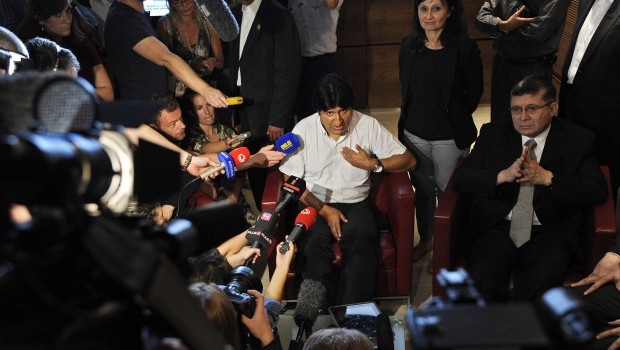
Bolivia’s President Evo Morales, center, talks to reporters at Vienna’s Schwechat airport, Wednesday, July 3, 2013.
Source: AP Photo/Hans Punz
Vienna, Reuters—Bolivia accused Austria of an act of aggression by searching President Evo Morales’ plane on Wednesday and blamed Washington for its forced landing in Vienna over suspicions that former US spy agency contractor Edward Snowden was on board.
Morales’ plane was stranded at Vienna airport for several hours after Portugal and France abruptly cancelled air permits for it to fly through their airspace, but eventually resumed its flight home form an energy meeting in Moscow.
Austria found no sign of Snowden on board. He is believed to still be in the transit area of a Moscow airport, where he has been trying since June 23 to find a country that will protect him from prosecution in the United States on espionage charges.
The diversion and search of Morales’ plane were the latest turns in the 30-year-old Snowden’s bid to escape the clutches of the United States since he divulged details of a secret US government surveillance programme, Prism.
Bolivian Foreign Minister David Choquehuanca blamed the forced stopover in Vienna on “unfounded suspicions that Mr Snowden was on the plane”.
“We don’t know who invented this lie,” Choquehuanca said in La Paz. “We want to express our displeasure because this has put the president’s life at risk.”
Bolivia’s ambassador to the United Nations told reporters in Geneva that Austria’s decision to search the plane was an act of aggression and a violation of international law.
The envoy, Sacha Llorentty Soliz, said he had no doubt that the orders to divert Morales’ plane came from the United States.
Austria’s deputy chancellor, Michael Spindelegger, confirmed Snowden had not been stowed away after Austrian authorities inspected Morales’ government plane but said the search had been permitted by Morales.
“Our colleagues from the airport had a look and can give assurances that no one is on board who is not a Bolivian citizen,” Spindelegger told reporters at the airport.
“Morales agreed to a voluntary inspection,” he added.
Austrian President Heinz Fischer said Spanish airspace was open to Morales’ plane.
The plane eventually left Vienna about noon on Wednesday, an airport spokesman said.
Bolivia is among more than a dozen countries where Snowden has sought asylum and Morales has said he would consider granting the American refuge if requested.
Snowden’s options have narrowed since he arrived in Moscow from Hong Kong with no valid travel documents after the United States revoked his passport.
US President Barack Obama has warned that an offer of asylum from a country would carry serious costs.
Russian President Vladimir Putin is unwilling to send Snowden to the United States, a move that could make it look weak, and it has no extradition treaty with Washington. But he also does not want to damage ties with the United States over a man for whom Putin, a former KGB spy, has little sympathy.
Five countries have rejected granting Snowden asylum, seven have said they would consider a request if made on their soil, and eight said they had either not made a decision or not received a request.
